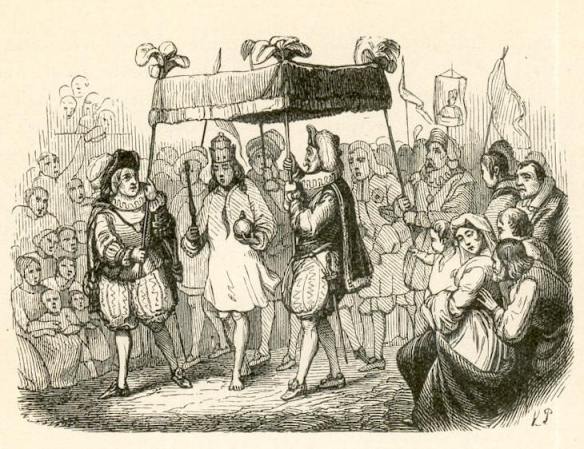Today we were: Susan Kempster, Tara Pilbrow, Alina Popa, Thelma Sharma, Bea Theiler and myself. We gather around a circle, sitting on a platform made of aikido mats to protect us from the cold floor at Chisenhale’s small studio, whilst I read aloud Hans Christian Andersen’s The Emperor’s New Clothes (I read it from this translation in: http://www.hca.gilead.org.il/emperor.html).
I tried to have another go, in a different way, to the session I facilitated earlier this month but adding the twist of Andersen’s tale this time. Once I read it and without entering to analyse the moral of the story, I asked “what if the detail in the story are inverted?” Something like: 1) the swindlers are really weavers, 2) nobody sees because they don’t [yet] understand and 3) the kid who points the emperor in the end of the tale says: “look, it is really a precious and colourful cloth made with the most wonderful threads forming the most unexpected patterns!!!”
I’m not suggesting to change the tale (it is wonderful as it is) but it seems to me that the paradox emerging from accepting both versions could be a very interested one…in the Andersen’s version people proof themselves stupid for being ashamed of being honest and admit they can’t see, but if the swindler were real weavers, disregarding their cloth as just a myth will prevent us from see it ever. Maybe a mid-place position towards it would be a more interesting one. Maybe we won’t see the clothes we were promised but something totally different and unexpected.
Following this logic and after practicing some authentic movement, and variations of the form with open eyes and simultaneous moving-talking being watched, and watching-talking whilst witnessing I ask people to come in and out of the space and try to have the binomial question “what do I do?/ what do they see me doing?” both whilst moving in the space and watching others move. Andersen’s story and its antithesis seem to place us in a perfect place to let go from the binomial question and the conflicts between the possible binomial answers, at the same time that letting go is not synonym of fading it into oblivion.
